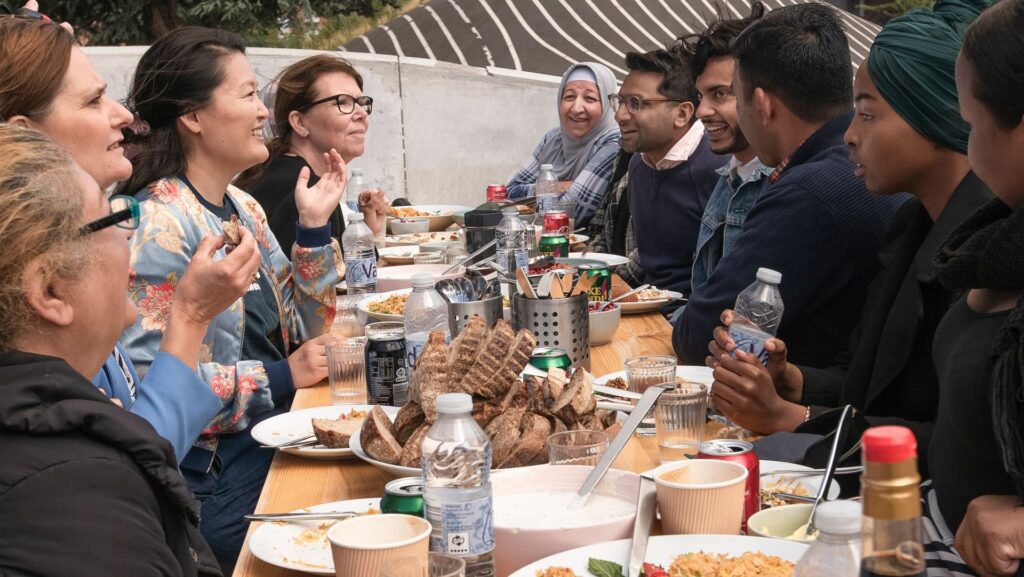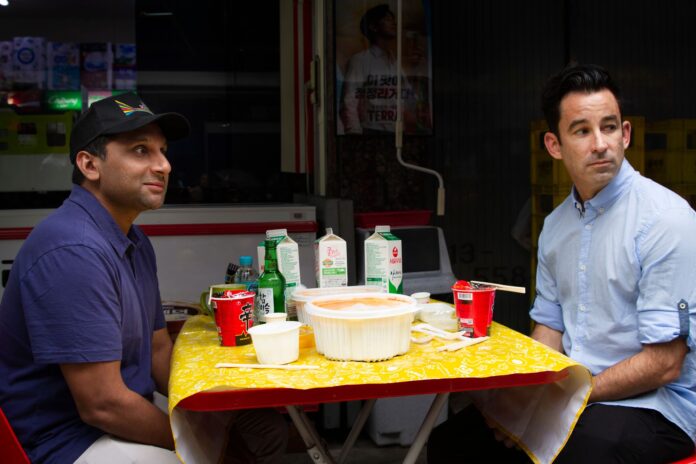Photo Courtesy of HBO Max
by Shree Baphna, AsAmNews Contributor
On the first watch, Ravi Patel’s Pursuit of Happiness is an identical recount of my own mother’s upbringing. She is also a child of Indian immigrants who moved to the United States in the early 1970’s and just like Patel and his sister, my mother grew up living the quintessential, middle-class American dream. From the get-go, Ravi’s origin story- centered on the theme of a deliberate movement ‘up in the world’ through hard work and dedication- is clearly important to his pursuit of happiness.
The first episode focuses on the question of retirement and aging as Ravi reflects on his relationship with his parents, Champa and Vasant. Ravi, Champa and Vasant take a trip to Mexico, which has become a “destination retirement hotspot”. Ravi and his parents set out to investigate this new retirement trend, a little different from the vision they had of living in close proximity with one another. The trio immerse themselves in both the retirement community and in the local, familial community in order to get a good sense of why Mexico is such an attractive place.
In my opinion, Ravi does a good job of drawing out the cultural aspects of Mexico which resonate in many ways with Indian culture. During the episode, Ravi and his parents join a family for lunch and are pleased to see how all members of the family live within the neighborhood. This is very much unlike the retirement community in Mexico who live away from their families back in the States. Similar to Mexico, the idea of living in proximity to one’s family has habitually been a part of Indian family structures.
LATEST STORIES
I appreciate how Ravi uses personal experiences from his parents’ lives to address the long-standing fear of isolation that is very relevant to immigrants who came to the United States. They left their entire families back in India and had little resources to call home. This is a topic that many first-generation immigrants (including myself) forget to think about when understanding the difficulty of leaving one’s home.
‘Retirement’ has never existed in Indian culture because most everyone lives in the same house in joint families and cares for the elderly. Retirement is a western notion that is just now starting to become relevant to those who arrived in the first immigrant wave of the ’60s and ’70s. By addressing this, Ravi shows a contemporary blend of Indian-American influences on a topic that many people grapple with around the world.
Overall, I think Ravi presents a very self-aware and understated aspect of a hybrid Indian American culture. It is refreshing to see him bring together both influences in a way that does not ridicule or stereotype the Indian American experience. He very candidly explains how he wants his own daughter to grow up appreciating the wisdom imparted from the elderly while simultaneously understanding the importance of independence in old age- aspects that are part of Indian and American cultures respectively.
Episode 2
In episode two, Ravi and his wife Mahayley travel to Japan to rediscover the role of parenting from a different perspective. As parents themselves, the Patels are constantly looking for strategies on how to be present for their daughter, while simultaneously working and making time for one another.
The episode touches on the many doubts and trials the couple has faced in the past few years, an excellent way to create relatability and outreach to viewers who might feel the same. Ravi is able to provide a certain rawness to the camera, presenting his sentiments as ordinary and human. He and Mahayley are largely able to demonstrate this when talking about the constant “guilt” that comes with being a parent, combined with the want for time away from their child.
On this particular trip, the Patels learn more about the culture of child-rearing in Japan, providing an interesting glimpse into daily norms. The couple observes many instances of how children are instilled with a strong sense of duty to society and others, which is very much a contrast to both American and Indian styles of parenting.
Like many others, I do enjoy seeing men clumsily taking on feminist causes, which is why I appreciated Ravi addressing the topic of gender roles in parenting. This is something that I think is amiss in many Indian and Asian-origin households altogether, given that societies in these countries are still very patriarchal. The use of humor by Ravi- especially when he attends “dad class”- gently debunks an unfair system and players (including himself) who participate and helps attract socially conscious viewers along the way.

Patel gives the audience an informative take-away once again as he brings out these contrasts in different cultures of parenting. He and Mahayley discuss the emphasis on discipline and ‘fitting in’ in child-rearing in Japan and compare it with the focus of individuality in the United States.
While this comparison was done in a thoughtful and reflecting manner, I think this was a missed opportunity for Ravi to compare Indian parenting styles a little more in-depth. Patel does not really delve into the complex parent-child relationship in Indian culture- a relationship made even more complex in immigrant families with different influences. Indian parenting tends to exclude children as passive individuals, rather than involve them as active participants. In Japan and, to some extent, the United States, children are treated more as absorbing individuals who see and understand their parents’ actions.
Episode 3
The third episode follows Ravi and his good friend Matt as they travel to South Korea on a mission to learn more about work-life balance. Consistent with the previous two episodes, Patel delves into a global aspect of life that has found its own niched manifestation in another country. Ravi and Matt immerse themselves with various people to learn more about work-life balance in South Korea.
Given that South Korea has a long history of “workaholism” and consequently, the 10th highest suicide rate in the world, this particular episode takes on the task of turning a negative situation into more of a teaching lesson. I think that Patel is successful in doing so, even if the way he does it is ‘cheesy’.
What I appreciated the most was that Ravi and Matt focused more on the coping mechanisms that have been put into place to combat the high-stress culture in South Korea, rather than indulge the audience in tragedies. The duo wades into it all- they eat spicy food to (literally) release stress, talk to a therapist and even visit a “death café” where they enact their own demises and write their eulogies before laying down in a wooden coffin.
RELATED: Ravi Patel speaks with AsAmNews: Inside the pursuit of happiness.
Of course, I assume some parts of it were a bit more dramatized than others (hence the ‘cheesy’ aspect), but Ravi and Matt are able to make light of the situation and convey a message that isn’t all doom and gloom. Most of all, I appreciate how unashamedly imperfect Ravi appears before the camera. He candidly admits his shortcomings in balancing work and his personal life, and in doing so, appears very relatable to his viewers.
The episode seems to touch on how relaxation and recreation are practices more a part of western culture and are treated like a separate activity, which is generally not the case in many eastern cultures. Once again, it would have been interesting for Ravi to bring in the intersection of him being Indian-American. As a child, he would have seen his parents work constantly in order to provide and live out the capitalist American dream to the fullest. Therefore, for Indian immigrants, relaxation might be a foreign concept when hard work and perseverance are seen as the keys to success.
Episode 4
The fourth and final episode addresses the biggest question of all – who is responsible for immigrants and refugees? In pursuit of the answer, Ravi travels to Denmark with another good friend, Abdullah. Like Ravi, Abdullah is also from an immigrant family and has a plethora of experiences related to his identity as a Muslim man of color. The episode establishes a slight cautionary approach to immigration on the part of Ravi, whereas Abdullah is a fierce activist and advocate for free movement across borders.

What I found most appealing about this episode was Ravi’s willingness to grow and learn. His opinions, by the end of the 42 minutes, took on a more informed and evolved stance as a result of his efforts to understand both sides of the argument. Ravi and Abdullah interact with a member of the refugee community in Denmark and interview people sympathetic to the refugee cause. On the other hand, Ravi and Abdullah also devote screen time to understanding why politicians may not want to be welcoming to asylum seekers and refugees.
Most importantly, Ravi and Abdullah bring up the differences between refugees and immigrants with respect to privilege. On one hand, immigrants had the choice to leave their homes for greater opportunity. On the other, refugees have no choice but to leave their homes for survival. This was most heartening to see because many immigrants who leave for a ‘better’ life fail to empathize with the plight of refugees who simply want the same thing. Ravi and Abdullah successfully shed light on this cruel irony, something that is not done enough on the part of the established immigrant population.
However, much of the episode felt like an ideological re-hashing of a problem in a bid to appeal to socially “woke” viewers. Unlike the other episodes, I did not really see the significance of traveling to Denmark in “pursuit” of an answer to this question. I agree that Denmark being a welfare-based country and still having qualms about refugees is meant to drive home the true extent of this issue’s complexity. Yet, this is a problem faced by many countries, welfare society or not. It leaves me wondering why Ravi did not focus on his own home country, the United States.
Patel and his family are a prime example of how the USA embodies positive values of diversity and opportunity for all. Sadly, it has recently contradicted every bit of these sentiments in the way it treats refugees and asylum seekers at the border. While Ravi means well by tackling a complex issue such as this, I felt the episode left loose ends. For me, it did not succeed to bring in Ravi’s personal touch in the way the series had started out.
Looking back on the four episodes as a whole, common themes emerge. Each episode tackles an aspect of life that Ravi himself is trying to come to grips with. They speak of finding happiness by constantly seeking to improve oneself and to share in that journey with others. Each travel companion of Ravi’s has personally been impacted by the topic for that specific episode. Every travel destination is carefully picked and embodies the topic of discussion in a way that is different from what viewers might have assumed. Overall, every episode is a well-packaged offering of information, humor, culture and humanity that is easy to absorb and enjoy. Ravi Patel is off-beat and uses his charisma to gently nudge the audience to thoughtfully consider the questions he asks.
My only wish is that Ravi would sprinkle in more hints of his Indian-American identity. In the end, I get the sense that some things had to be softened to attract the educated White and moderate liberal audiences watching. Patel, in an interview with AsAm News, stated that “there is not one definition” of being Indian-American. I wholeheartedly agree.
However, given the extreme personal facet of this series, I think Ravi is a little ‘too’ good at being relatable to the ‘general American’ audience. As an Indian-American myself, I personally crave for esoteric references that make him more accessible to the immigrant community. It is high time mainstream media uplifts the jagged differences in cultured content rather than hammer it down into a smooth whole. The series left me hopeful for future entertainers of color to champion their culture more than has been done in the past.
AsAmNews has Asian America in its heart. We’re an all-volunteer effort of dedicated staff and interns. Check out our new Instagram account. Go to our Twitter feed and Facebook page for more content. Please consider interning, joining our staff or submitting a story.








